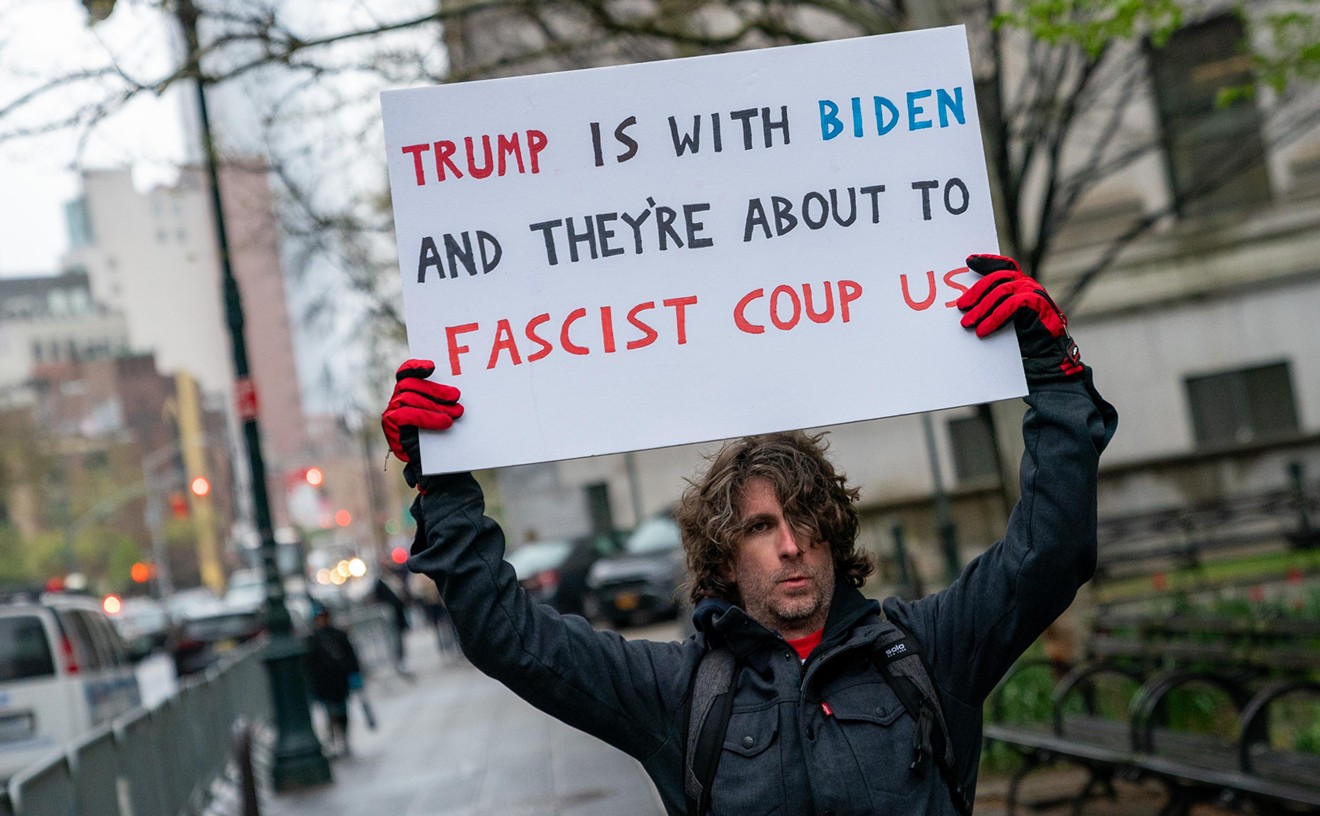Para leer la versión en español, haga clic aquí.
The sailor is five-foot-ten, handsome, and muscular, with a sizzling smile. But on this day in Kabul, Afghanistan, he's wounded and crawling in the dusty, rutted road next to a blackened, burning building. He struggles to stand beside an olive-colored Humvee. Then, suddenly, a uniformed figure nearby lowers his rifle and takes aim. The distance between the two is no more than 15 feet.
A shot sounds.
The sailor falls.
The gunman fires again, and after a slight pause, twice more.
Louis Maxwell Jr. — ace trumpet player, jujitsu black belt, and new dad — is dead. It's October 28, 2009, and inside the flaming guesthouse, three United Nations elections monitors also lay lifeless. Maxwell and an older colleague from Ghana, Laurance Mefful — also killed — had been guarding them, as well as others who had fled.
United Nations Secretary General Ban Ki-moon hailed the 27-year-old from Miami Gardens and his fellow sentry as heroes. "They fought through the corridors of the building and from the rooftop," he told the UN General Assembly. "They held off the attackers long enough for their colleagues to escape, armed only with pistols against assailants carrying automatic weapons and grenades and wearing suicide vests."
It wasn't over. A week later, the UN pulled half its workers from the country. Then, this past spring, a German newspaper released a cell-phone video that revealed an ugly truth. Our corrupt allies had murdered a local hero. A UN investigation partially confirmed this finding.
Now all evidence has been handed over to the Afghans. Yet there has been no attempt to find the killers — only a slew of bureaucratic buck-passing. In addition, the U.S. government has refused to pressure Afghan President Hamid Karzai, according to two UN officials. The FBI, one of the officials said, has been probing the matter for at least six months but apparently has achieved nothing.
The failure to find Maxwell's killers raises questions about the U.S. strategy and resolve in Afghanistan. The attack was very possibly revenge for the UN's conclusion, now widely forgotten, that Karzai's election was a fraud.
The reason no one cares to find the truth, I believe, lies with the Obama administration's chaotic and inept approach to the war there. Karzai's recent rapprochement with the Taliban, combined with the firing last month of U.S. Army Gen. Stanley McChrystal, have left U.S. leaders in a quandary about their next step.
"There's a lack of integrity both on the part of the U.S. government and the [United Nations] on this," says Matthew Lee, an attorney and blogger who has followed the matter. "They want to sweep it under the rug. No one's following up, and this is cold-blooded murder."
Louis Maxwell Jr. was born and raised in Miami Gardens — which back then was Carol City — a stone's throw from the Broward County line. His mom, Sandra, and his dad, Louis Sr., had one daughter, Aijalon. The two siblings were very close from the start. "He was my shadow," says Aijalon, who's 12 years older than her brother.
Jay, as they called him — short for Junior — was a tough, strong-willed kid, both at home and at Skyway Elementary School. When he was just 3 or 4 years old, his mom recalls, a friend gave him a toy riding train. One day, he disappeared into the yard with it. Suddenly, Louis Sr. spotted the tot bleeding profusely from the forehead. Little Jay calmly explained he had tugged the toy onto the top of the family car and then driven it off the edge. The Maxwells scooped him up and rushed to the emergency room.
"When we got to Miami Children's, his pediatrician came and explained, 'Yes, Mrs. Maxwell. He did it. He really did it,'" Sandra Maxwell recalls. "Jay was calm. No one else was."
Sandra and Louis Sr. divorced in 1990. Aijalon's then-boyfriend, a martial arts fanatic named Lutalo, became Jay's mentor. The two formed a firm bond in physical training that would eventually lead Jay Maxwell to the bombed-out guesthouse in Kabul.
The boy also found solace in music, playing the violin and trumpet. At fifth-grade graduation from Skyway, Jay impressed a crowd with a song on the xylophone. "His teacher said she had never met a student like him," Sandra says. "He was talented but fun-loving, just the kind of guy who would make you laugh."
After attending Westview Middle School, he moved on in 1995 to Miami Central High, a tough school with a first-rate music program. He was an average student with impressive self-discipline. Music teacher Shelby Chipman recruited him for the school's marching band, one of the best in the nation, and Jay quickly became a leader among its 265 musicians.
Early on Sunday mornings, Chipman could hear Jay's trumpet notes filter into his kitchen as coffee brewed. He lived just a block from his student. "At band practice, I'd ask who practiced over the weekend. A few hands would go up, and then I'd say, 'I know one person did, because I heard him,'" recalls Chipman, now a professor at Florida Agricultural and Mechanical University in Tallahassee. "His ability to keep working and not get discouraged made him unique."
But music wasn't enough. Jay's oversize sense of adventure and desire to serve his fellow man led to an infatuation with the military. From his early teens, he trained with Lutalo, who married Aijalon in 2002. Sometimes they'd go to a shooting range together in Broward. Or they'd run and do heavy calisthenics at Amelia Earhart Park in Hialeah.
"It was competition," recalls Aijalon's godmother, Flora Ray. "They would run up and down a hill again and again, then do 25 pushups. It wouldn't stop until one surrendered."
At age 17, Jay visited a Navy recruiter, who said the young man would need his mom's permission to sign up. Sandra was unsure, but he begged. In December of his senior year, she relented and signed. Though Jay's talent as a trumpeter drew a scholarship offer from FAMU, he shipped off to basic training after graduating and turning 18 that summer.
No one in Jay's family will discuss his six-year stint in the Navy, which wouldn't provide records on his service. He wasn't, as other media outlets have reported, a Navy SEAL. But he did spend time in Bahrain and San Diego. And he served during the invasions of Iraq and Afghanistan. "There are things we haven't told my parents," Aijalon says. "There are things I can't tell you."
In 2006, Jay retired from the Navy and briefly returned to Miami. He settled uncomfortably into domestic life. He'd had a son at age 19, and the boy looked much like his dad with close-cropped hair and a bright smile. Though Jay had split from the boy's mother and settled in with a new girlfriend from Alabama named Angel, the families remained close.
Early in 2008, Angel became pregnant, and he charted plans to buy a home. He didn't tell his mother, who was preparing to retire as an assistant principal at Richmond Heights Middle School. "It was going to be a surprise," Aijalon recalls. "He was going to say, 'Look what's in my name. You decorate it, mom.'"
Jay worked briefly as a personal trainer, but adventure beckoned again like a Siren. The handsome, buff South Floridian applied to follow his older sister's husband and guide, Lutalo, into the United Nations security force. The money, which was good, would help propel his new life.
After brief training, he shipped off to Beirut, where, according to his sister, he watched for suicide bombers who threatened a tribunal investigating the 2005 murder of Lebanese ex-Premier Rafik Hariri. It was Jay's first assignment, and it provided a taste of international intrigue.
Then one day in 2009, he received orders to pack his bags and head for Kabul. It was just a few months before critical elections would determine Afghanistan's relationship with the United States and the Muslim world. He would guard elections monitors. He would die.
Next week: Jay's murder sets off a political fight that leads to the White House.











